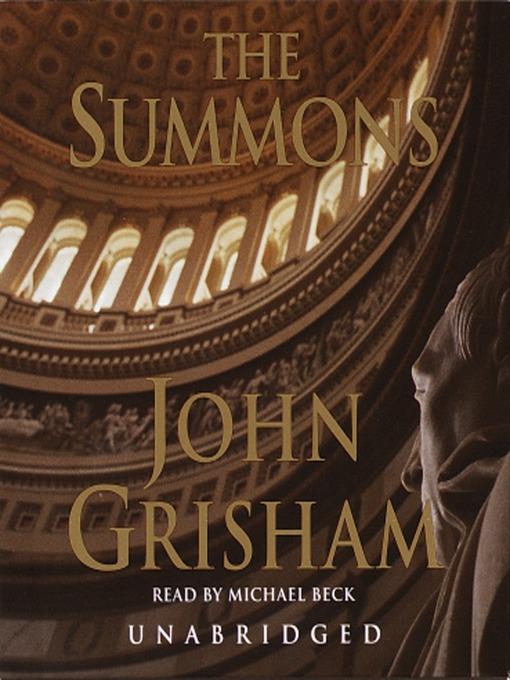
The Summons
کتاب های مرتبط
- اطلاعات
- نقد و بررسی
- دیدگاه کاربران
نقد و بررسی

Before embarking on this latest Grisham novel, which revolves around a troubled father-son relationship, you should first ask yourself about your tolerance for Southern accents--not only the lilting, aristocratic Virginia version, but the voluptuous, molasses-dripped Mississippi variety. (Think "Saturday Night Live" renditions of a certain former president from Arkansas.) Michael Beck's reading is enjoyable, even as it threatens to overwhelm this story, which concerns law professor Ray Atlee's discovery of $3 million in mystery cash in his boyhood home after the death of his autocratic father, Judge Atlee. Strong as Beck's accents are, they fit the characters and ultimately bring them further to life. M.O. (c) AudioFile 2002, Portland, Maine

April 1, 2002
Beck offers a fine performance in this no-frills production of Grisham's latest, despite its lack of overall narrative zip. University of Virginia law professor Ray Atlee stumbles upon more than $3 million in cash in the rural Mississippi house of his dead father, then tries to discover the source of the money and elude an increasingly persistent and menacing extortionist. Beck is a dynamic reader and excels at tackling the challenge of capturing the characters' Southern twang in the story's dialogue. Ray's voice is refined and authoritative, while that of his black sheep brother, Forrest, carries a slight crack that befits a person lacking in confidence and maturity. Family friend and local lawyer Harry Rex stands out the most, and Beck also deftly portrays a smarmy, boozing Delta attorney who calls himself the "King of the Torts." But even with these intriguing, well-rounded characters and a nice evocation of the legal system's more unsavory machinations, the plot won't move listeners to the edge of their seats. Beck, however, does well with what he has, which is a decently written but rather sluggish tale of suspense with a quirky cast and one good twist at the end. Simultaneous release with the Doubleday hardcover (Forecasts, Feb. 4).

February 4, 2002
Last year's historical family drama A Painted House
and the Christmas satire Skipping Christmas
demonstrated that Grisham is willing to take risks. But fans of his legal thrillers already knew that, with his last three, particularly The Testament, making Play-Doh of the rules of the genre. Sometimes Grisham's friskiness works, and sometimes it doesn't. There's much to admire in his newest thriller, particularly his colorful evocation of a Deep South legal setting, his first use of this milieu since his debut novel, A Time to Kill, and some finely drawn characters. Even so, this isn't one of his most satisfying books, for while the narrative engages, it never catches fire. The setup is prime Grisham: Ray Atlee, a professor of law at the University of Virginia, is summoned home to Clanton, Miss., to the deathbed of his father, legendary judge Reuben V. Atlee; also summoned is Ray's younger brother, Forrest, a chronic drug abuser. Ray arrives home first, to find the judge dead and more than $3 million stored in boxes in a cabinet—cash not mentioned in the judge's will and whose source baffles Ray. Grisham does a wonderful job of digging into Ray's increasingly frazzled head as, stunned, the professor decides to keep the money a secret, even from Forrest, and to safeguard it until he figures out what to do. Greed, frayed nerves and fear plague Ray during the coming weeks, as he investigates, scrambling from one hideout to the next, becoming ever more aware that someone dangerous is following him and wants the money. Several scenarios—Ray's indulging his passion for flying small planes; his playing some of the cash at casinos to test it for counterfeiting; his dealings with screwed-up Forrest and his father's cronies, notably an ex-mistress and a wily old attorney—propel the story, and Ray, forward to the source of the money, a revelation that allows Grisham to take his usual swipes at big lawyerism but which will register for many as anticlimactic—though there's a final twist that as nifty and unexpected as anything Grisham has wrought. Grisham's writing is silky smooth here, his storytelling captivating; but the novel's lack of action—a stone thrown through a window is as violent as it gets—and the dissipation of all tension too far from the end make this, while a clever tale, one that's just too quiet. Grisham's fans might as well trim their nails while reading this, because they sure won't be biting them.

























دیدگاه کاربران